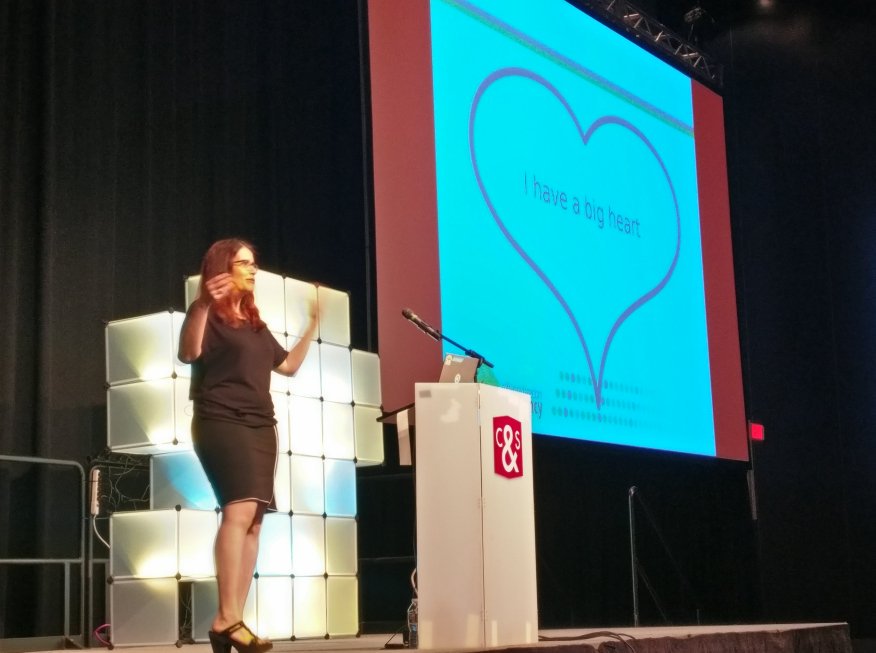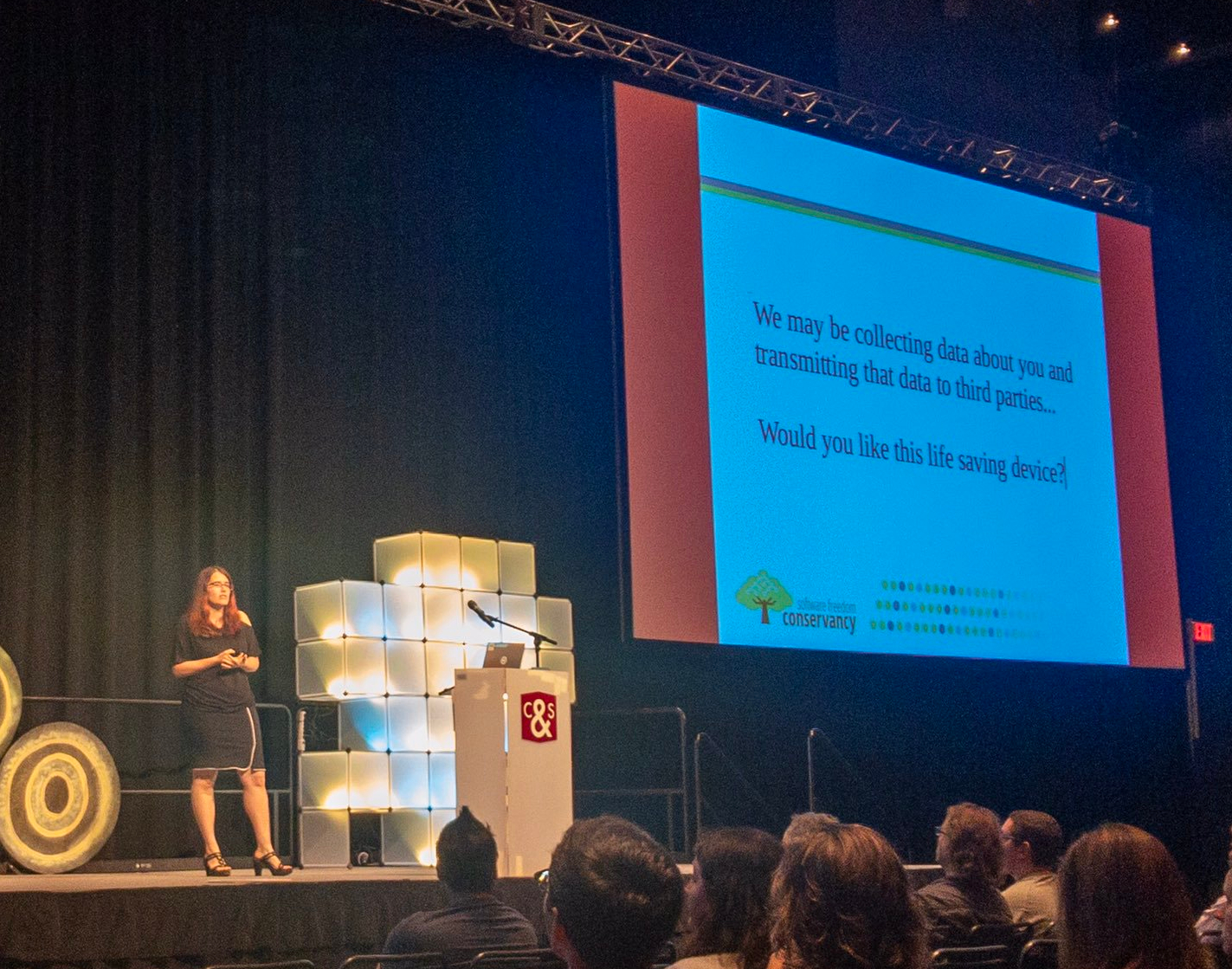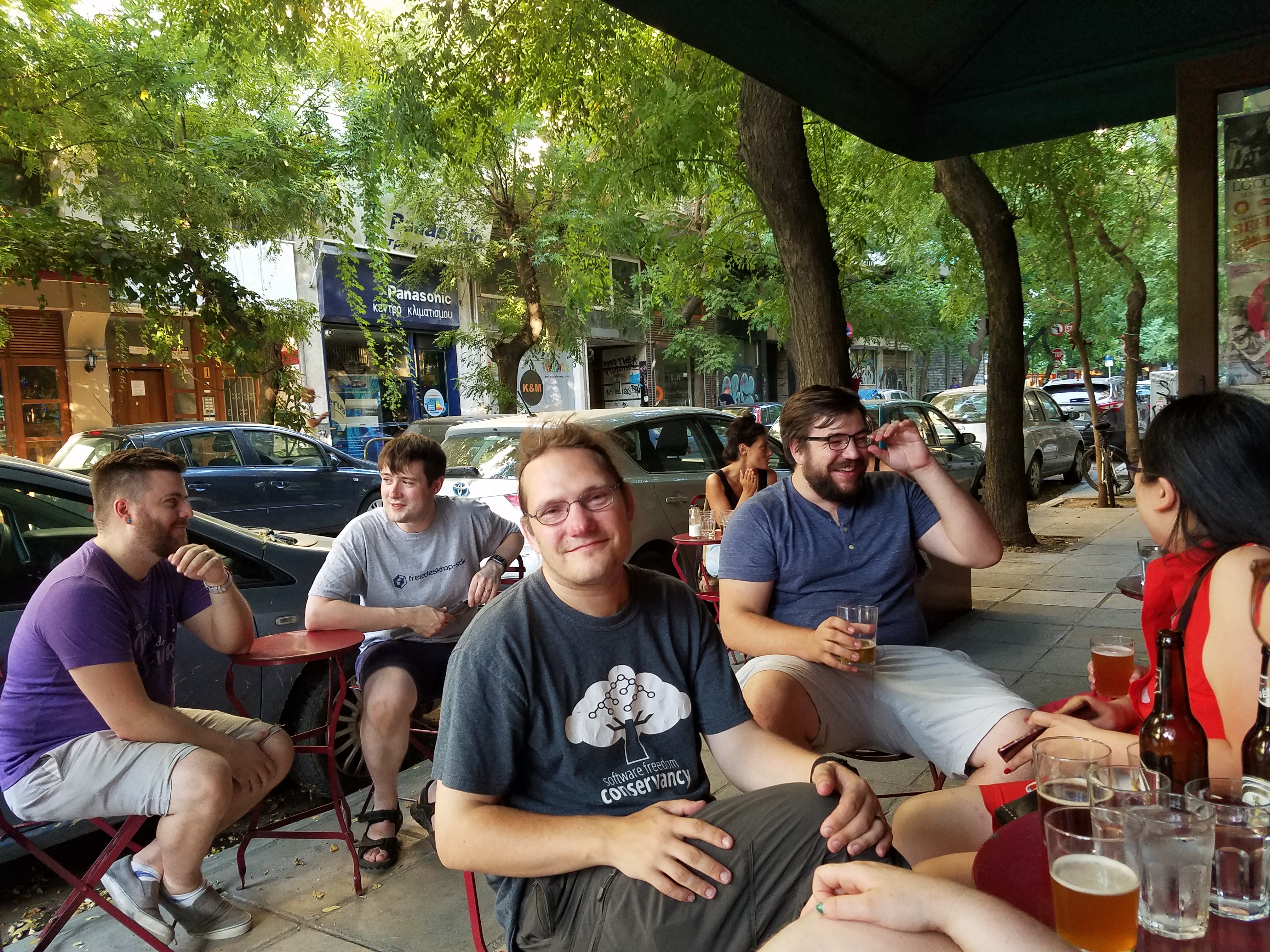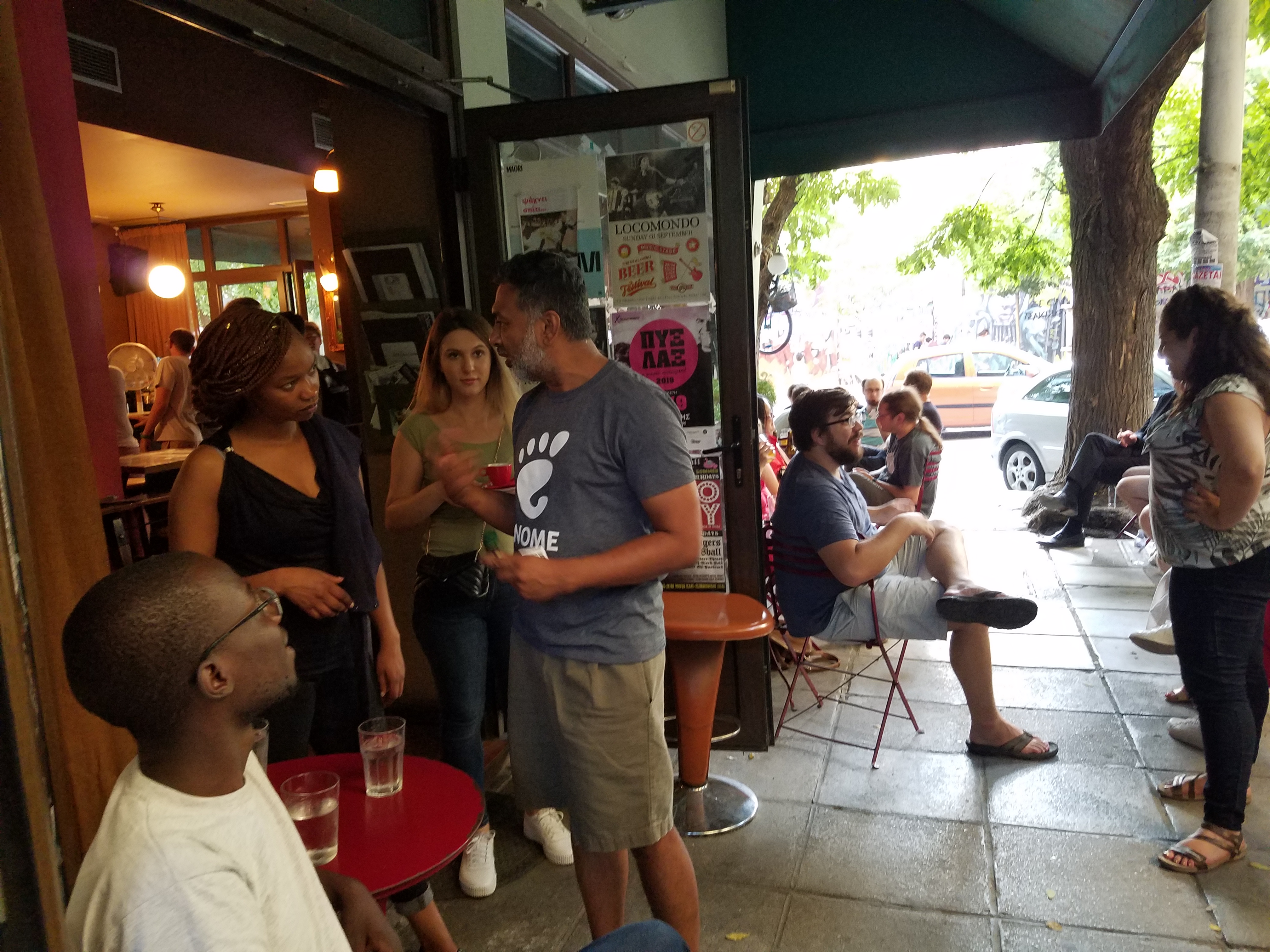![[RSS]](/static/img/feed-icon-14x14.2168a573d0d4.png) Conservancy Blog
Conservancy Blog
Displaying posts
tagged Google Summer of Code
![]()
Conservancy News Round-up August
by on September 11, 2019
Updates from many of our projects' departing summer interns, updates on what our contractors have been up to and pictures from recent events.

Picture is available under a CC.BY license and was taken by Sarah Withee

Picture is available under a CC.BY licenses and was taken by Zach Harris

Picture is available under a CC.BY.SA license and was taken by Deb Nicholson

Picture is available under a CC.BY.SA license and was taken by Deb Nicholson
Recent Videos and Pictures
Our Executive Director, Karen Sandler, is going to be part of an upcoming French documentary about the global fight for software freedom. The English version will be titled "Hackers For The Commons" and you can already check out the trailer (along with a fundraiser for the English version), right here. There are a few upcoming screenings scheduled of the French version.
Check out these two pictures from Karen's Abstractions talk last month! (top)
Deb held a "Supporters & Friends" event during GUADEC. Check out these nice pictures of folks talking about software freedom in Thessaloniki! (below)Upcoming talks from staff
Bradley is keynoting the 8th edition of Kernel Recipes in Paris on September 26 & 27. Conservancy is also this year's featured non-profit beneficiary. Registration opened this week.
Karen will be keynoting State of the Map in Heidelberg in September, on Saturday, September 21st.
Deb is speaking about "Selenium and Conservancy" at Selenium Conf this October.
Deb is also co-presenting with Nithya Ruff (the Head of Comcast’s Open Source Program Office) at All Things Open on "Companies and Communities: Why Can't We All Just Get Along?"
Interns are wrapping up for the summer
- Read this lovely wrap up from Niharika. titled: Last post!
- Plus this parting blog post from Priscillah, about her work on mUzima mobile.
- From Buildbot, Rajdeep Bharati reports on his Google Summer of Code work on MacPorts.
- Asami finishes his work adding QEMU/AArch64 Support to Coreboot
- A big omnibus report on Godot's eight GSoC students.
Also, applications are currently being accepted for the next round! Outreachy internships are remote, paid ($5,500 stipend), and last three months. Initial applications for the Dec 2019 to Mar 2020 internships are due on Sep 24 at 4pm UTC. Please help us reach folks who could benefit from an internship by sharing with your networks!
Conservancy contractors have been working hard
Lots happening at Reproducible Builds, including more work on diffoscope, new variations in their testing framework.
Over at phpMyAdmin, in addition to the intern that was sponsored directly through Conservancy, work focused on the request router and time with the Google Summer of Code interns who both wrapped up and reported on their work this summer, here and here.
Clojurists Together started work on four new projects. You can read about them all here.
Loads of fresh code!
- Wine 4.15 Released
- Git 2.23 Release Notes
- Boost Version 1.71.0
- Racket version 7.4 is now available
- You can try the new alpha Selenium IDE
- Lots of Linux XIA patches accepted
- QEMU version 4.1.0 released
- Twisted 19.7.0 Released
- Three new releases available from Evergreen!
- WebSocket updates, UDP multicast for Godot
- Samba 4.11.0rc3 Available for Download
- SWIG-4.0.1 released
Member Projects: Fall is for learning
- North Bay Python has tickets on sale now!
- Selenium Conf London also has tickets on sale now!
Thanks to Chris Lamby for promoting Conservancy with complimentary beer mats at the recent Debian BBQ!
Conservancy News Round-up
by on May 28, 2019
May is for code releases! Check out these videos, blog posts from member projects, code releases and upcoming events.
Recent Videos and Podcasts
Deb's talk on Free Software/Utopia is up, on the Free software Foundation's MediaGoblin server.
Deb was also the guest of honor on Libre Lounge, Episode 19: Community Development with Deb Nicholson. Thanks to Chris and Serge for their dedication to free software and to Conservancy's work!
On Free as in Freedom, Karen and Bradley discuss two additional permissions that can be used to “backport” the GPLv3 Termination provisions to GPLv2 — the Kernel Enforcement Statement Additional Permission, and the Red Hat Cooperation Commitment.
Our Member Projects Have Been Busy
This summer's Outreachy interns were announced. "Congratulations to the 43 interns accepted to the Outreachy May 2019 to August 2019 round!"
phpMyAdmin -- along with several other Conservancy projects -- are excited about participating in Outreachy this round.
MicroBlocks presented at ROBOLOT, an educational robotics conference held in Catalan. The video of their panel is about 75% Catalan and 25% English, so feel to skip around or brush up on your Catalan.
The Godot team attended GDC, aka the "Game Developers Conference" in San Francisco reported on their improved name recognition at this year's event.
The folks at Reproducible Builds, shared" that security and software supply chain attacks were in the news and that this was a busy month for their distro work.
Some recent code releases:
- Kallithea 0.4.1 released
- Mercurial 5.0 released
- QEMU 4.0 adds micro:bit emulation support
- Samba 4.10.4 available for download
- SWIG-4.0.0 released
- Wine 4.0.1 released
Etherpad merged in a big chunk of code to improve recovery from brief server outages. "The resulting code is 15% smaller than before, and is also much easier to comprehend."
What's coming up?
Catch up with staff:
Karen keynotes sambaXP on June 5th at 10:15 local time in Göttingen, Germany.
Bradley will be at the Ninth Annual RacketCon in Salt Lake City, Utah, where he will give a talk titled, "Conservancy and Racket: What We Can Do Together!"
Many of our projects have events coming up:
In addition to the aforementioned sambaXP and RacketCon...
First talks are announced for Selenium's upcoming London conference, tickets are available now.
North Bay Python has announced their dates for this year's event, November 2 & 3, 2019. Talk submissions will open soon!
Understanding Conservancy Through the GSoC Lens
by on September 11, 2014
[ A version of this post originally appeared on the Google Open Source Blog. ]
Software Freedom Conservancy, Inc. is a 501(c)(3) non-profit charity that serves as a home to Open Source and Free Software projects. Such is easily said, but in this post I'd like to discuss what that means in practice for an Open Source and Free Software project and why such projects need a non-profit home. In short, a non-profit home makes the lives of Free Software developers easier, because they have less work to do outside of their area of focus (i.e., software development and documentation).
As the summer of 2014 ends, Google Summer of Code (GSoC) coordination work exemplifies the value a non-profit home brings its Free Software projects. GSoC is likely the largest philanthropic program in the Open Source and Free Software community today. However, one of the most difficult things for organizations that seek to take advantage of such programs is the administrative overhead necessary to take full advantage of the program. Google invests heavily in making it easy for organizations to participate in the program — such as by handling the details of stipend payments to students directly. However, to take full advantage of any philanthropic program, the benefiting organization has some work to do. For its member projects, Conservancy is the organization that gets that logistical work done.
For example, Google kindly donates $500 to the mentoring organization for every student it mentors. However, these funds need to go “somewhere”. If the funds go to an individual, there are two inherent problems. First, that individual is responsible for taxes on that income. Second, funds that belong to an organization as a whole are now in the bank account of a single project leader. Conservancy solves both those problems: as a tax-exempt charity, the mentor payments are available for organizational use under its tax exemption. Furthermore, Conservancy maintains earmarked funds for each of its projects. Thus, Conservancy keeps the mentor funds for the Free Software project, and the project leaders can later vote to make use of the funds in a manner that helps the project and Conservancy's charitable mission. Often, projects in Conservancy use their mentor funds to send developers to important conferences to speak about the project and recruit new developers and users.
Meanwhile, Google also offers to pay travel expenses for two mentors from each mentoring organization to attend the annual GSoC Mentor Summit (and, this year, it's an even bigger Reunion conference!). Conservancy handles this work on behalf of its member projects in two directions. First, for developers who don't have a credit card or otherwise are unable to pay for their own flight and receive reimbursement later, Conservancy staff book the flights on Conservancy's credit card. For the other travelers, Conservancy handles the reimbursement details. On the back end of all of this, Conservancy handles all the overhead annoyances and issues in requesting the POs from Google, invoicing for the funds, and tracking to ensure payment is made. While the Google staff is incredibly responsive and helpful on these issues, the Googlers need someone on the project's side to take care of the details. That's what Conservancy does.
GSoC coordination is just one of the many things that Conservancy does every day for its member projects. If there's anything other than software development and documentation that you can imagine a project needs, Conservancy does that job for its member projects. This includes not only mundane items such as travel coordination, but also issues as complex as trademark filings and defense, copyright licensing advice and enforcement, governance coordination and mentoring, and fundraising for the projects. Some of Conservancy's member projects have been so successful in Conservancy that they've been able to fund developer salaries — often part-time but occasionally full-time — for years on end to allow them to focus on improving the project's software for the public benefit.
Finally, if your project seeks help with regard to handling its GSoC funds and travel, or anything else mentioned on Conservancy's list of services to member projects, Conservancy is welcoming new applications for membership. Your project could join Conservancy's more than thirty other member projects and receive these wonderful services to help your community grow and focus on its core mission of building software for the public good.
